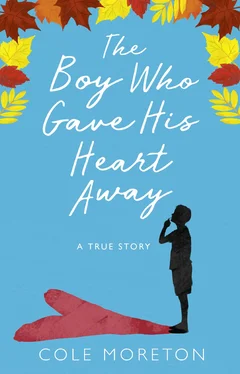For now, though, Martin could enjoy the sweltering days of late August with his friends. He was fit and happy, says his mum. ‘There was absolutely no sign whatsoever that anything was about to go wrong.’
The long, bright corridors of the newly rebuilt Royal Infirmary of Edinburgh could have been the set of an American medical drama. Linda McCay wandered them in the early hours of the morning, not really knowing or caring where she was going, clutching a Bible tight to her chest and praying out loud for her boy.
‘Please don’t take my son. I’ll do anything you want. I’m sorry for everything bad I’ve done in the past. I will be a better person. I’ll not smoke …’
Her blonde hair was tangled like a bird’s nest after being twisted and pulled over the six days and nights she had kept up a vigil for Marc in that large, intimidating new hospital on the edge of the city. Sometimes she cried and walked until morning. Sometimes she sat in the chapel. Sometimes she slumped in a chair in a corner somewhere, oblivious to a passing trolley with its urgent crew of attendants or a weary nurse coming off shift who had taken too much crap that night to intrude – and sometimes Linda just prayed and had no idea what else she was doing. ‘Please. Anything. I promise, I promise …’
In front of her, a man thumped the vending machine with the flat of his hand, cursing. Linda recognised him as one of the doctors in the team trying to keep her son alive, a crumpled figure in need of an iron for his shirt but with an air of authority. There were bags under the bags under his eyes, but she knew Marc’s life depended on him and his colleagues. The doctor gave up on the machine for a moment and offered Linda a weak, weary, sympathetic smile.
‘Your son has been unlucky. Very unlucky indeed.’
A virus had probably attacked Marc while he was on holiday in Ibiza. Maybe a snotty kid had wiped his runny nose with the back of a hand, before leaving an invisible smear on a table top or a drinking glass. The little boy would never have known he was a carrier. A fever was easy to miss in a hot place, if you were in and out of the pool all day. Anyone could have come along and picked up the virus in that smear but it was Marc who did so, perhaps as he took a drink or lay down a poker card on the table. Maybe he put his fingers to his mouth just then, absent-mindedly. Maybe he stopped a sneeze. Maybe his eye was irritated by a trace of sun cream, so he rubbed it. Either way, the bug entered his body. That was when his luck turned really bad.
Most people catch a cold or a sore throat from the same virus but after a few days the body fights it off and the bad feeling passes. This time the cells of the virus travelled through the bloodstream all the way to the meaty muscle of Marc’s heart. This is the myocardium and a bad attack by a virus leaves it thin and inflamed, a rare condition known as acute viral myocarditis. We don’t pay that meaty muscle much attention, but it is the practical reason we go on living, the engine room of our ship, the physical source of the power that keeps our lights on. Ba-boom, ba-boom, ba-boom. That’s the rhythm of life, the sound of the engine working, pumping blood into the lungs to pick up the oxygen we need to survive, then pumping it on again to feed the rest of the body.
When the engine fails, we know it. The lights go out.
Marc’s heart was ill and swollen and could beat only weakly so the blood was not getting around his body properly. His organs were being starved of the oxygen they needed and they were failing – his liver was drying up, his lungs filling with blood. Marc was fading fast.
His family took turns to stand by his bedside, watching over him. Leasa, his sister, who was just nineteen and studying to be a nurse, had read that if you cry in front of people who are unconscious they might hear you and get scared, but if you tell them stories or sing it might stimulate their brain. So she sang to him. The song that came to mind was called Pretty Green Eyes by Ultrabeat and it usually had a massive club sound; but as she sat there by his bedside in the quiet murmur of the hospital, singing into his ear, her pure, clear voice made it sound like a song as old as the hills.
Pretty green eyes,
So full of wonder and despair,
It’s all right to cry, for I’ll be there to wipe your tears …
You’ll never have to be alone.
Blood is pumped away from the heart to the rest of the body through the arteries and one of them runs deep through the groin and the leg. For the doctors, it offers a way into places that are otherwise untouchable without surgery. They injected Marc with a long needle and pushed an impossibly thin, flexible pipe through the needle, into the artery and all the way up his body against the flow of blood, into his chest. Gas was used to inflate and deflate a six-inch-long balloon on the end of the pipe so that it rose and fell inside the aorta – the main artery of the body – with a natural rhythm to match that of the heart, allowing the inflamed and weary muscle to rest and recover its strength. Amazing … but it wasn’t enough.
Marc’s heart was too damaged and weak for the balloon to help much, so they tried a more advanced piece of kit that was new to the Royal Infirmary: a device that sucked blood out of the body, gave it oxygen and pumped it back in – a bedside mechanical stand-in for the heart and lungs. This was cutting-edge technology that made the television news that evening: ‘For the first time ever in Scotland, a mechanical assist has been used to keep a patient’s heart going.’ And it was a fantastic success at first. The monitors that had been so quiet as Marc lay there, barely functioning, now bleeped and flashed as his body found new strength.
Norrie, Marc’s father, who was a roofer in his forties at the time, remembers what he said when he saw the screens behind Marc come to life: ‘Wow, this is us sorted. It’s like the Blackpool Illuminations in here!’
Linda was in the room with him and she was just as thrilled. She grabbed hold of her ex-husband and laughed, but the joy didn’t last. The movement on the monitors slowed again and then stopped, and within half an hour they were as quiet as before. Marc was sinking again. And the high was followed by a new low. Linda saw something else now, something that horrified her. She noticed that the colour had begun to drain from Marc’s legs, leaving them grey with white and red blotches. The death tartan. She recognised that from seeing patients die on her ward.
‘That’s it, he’s going now,’ she thought, getting angry. ‘This is not the way the world is meant to work. They are not supposed to go before us!’
So says every parent who has had to watch a child die. Stunned and confused, she and Norrie went back to the family room, where their sons and daughter and Linda’s mother did not know what to say. Then the doctor entered the room too and the sky fell in.
‘Marc is dying right now, as we speak, and there is nothing else we can do.’
Linda heard a fierce sound like a riot in the street outside, but it was right beside her: Betty, her ‘wee, sensible mother’, going frantic. Linda heard her cries through the double glazing of panic and fear. Norrie was angry too, but their daughter Leasa tried to hold it all together for all of them. The eldest and quietest child was also the strongest, and now as the doctor talked again about a virus and tried to explain myocarditis she interrupted him and the words came spilling out of her. ‘What does that mean? He’s fit, he’s healthy, he doesn’t drink and he doesn’t smoke. We’ve got no history of heart problems in the family. What are you talking about?’
She thought of her brother, wrapped in silver foil to keep the heat in as warm air was fanned over his body, and Leasa felt as if the doctors had already made their decision and all this medical jargon was a way to justify letting him go. ‘It was like they were giving him his last rites.’
Читать дальше












